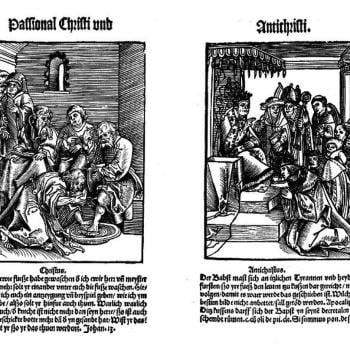Now Featured in the Patheos Book Club
Happiness
By Randy Alcorn
Your book Happiness challenges the idea that God wants his followers to be holy but not happy. What do mean by that?
Holiness doesn't mean abstaining from pleasure; holiness means recognizing Jesus as the source of life's greatest pleasure. Spurgeon put it this way: "Holiness is the royal road to happiness. The death of sin is the life of joy." For those of us who are Christ-centered believers, our lives should overflow with both holiness and happiness.
In Revelation 20:6, makarios, meaning "happy," is joined with hagios, meaning "holy." The following versions capture this beautiful combination:
• Happy and holy [is] he who is having part in the first rising again. (YLT)
• Those who are raised from the dead during this first time are happy and holy. The second death has no power over them. (NLV)
• Happy and holy is the one who shares in the first resurrection! (PHILLIPS)
Sadly, too often our message to the world becomes a false gospel that lays upon people an impossible burden, as in, "To be a Christian, you must give up wanting to be happy and instead choose to be holy." In fact, happiness and holiness are inseparable. "Give up happiness; choose holiness instead" is not good news, and therefore it is not the "good news of happiness" spoken of in Scripture (see Isaiah 52:7)!
Does it matter whether we believe that God is happy?
It matters immensely. If God isn't happy, he can't be our source of happiness. An unhappy God would never value nor assure the everlasting happiness of his creatures. We would never ask for grace from an ungracious God, kindness from an unkind God, or happiness from an unhappy God. It would be like asking a poor man for a million dollars. He can't give what he doesn't have.
If God were not happy, the fact that all people seek to be happy—as Augustine, Aquinas, Pascal, the Puritans, Wesley, Spurgeon, and many others have observed—would be a cruel tragedy, since it would mean that God cannot give us what we most deeply desire. At best he might deliver us from the miseries of Hell. But Heaven can overflow with happiness only if God himself overflows with happiness. Our Creator's happiness guarantees a happy ending to the story that will never end.
The Bible frequently depicts God as being delighted and pleased, and twice God is described as makarios, a Greek word meaning happy (see 1 Timothy 1:11; 6:15).
Does the Bible distinguish between happiness, blessedness, joy, and gladness?
We imagine sharp distinctions between Hebrew and Greek synonyms and also the chosen English words, such as joyful, glad, or happy. Only when we recognize how meanings overlap in words from the same semantic domain, or word family, will we be saved from making artificial distinctions between the corresponding English words. In fact, these words are far more alike than different.
Is happiness much different from joy?
Judging from countless hundreds of articles, books, and sermons, you'd think the distinction between joy and happiness is biblical. It's not. Here's a sampling of the more than one hundred Bible verses in various translations that use joy and happiness together. (Note that I've italicized some words for emphasis.)
• For the Jews it was a time of happiness and joy, gladness and honor. (Esther 8:16, NIV)
• I will turn their mourning into joy . . . and bring happiness out of grief. (Jeremiah 31:13, HCSB)
• Give your father and mother joy! May she who gave you birth be happy. (Proverbs 23:25, NLT)
The relationship between joy and happiness in these passages refutes two common claims: (1) that the Bible doesn't talk about happiness and (2) that joy and happiness have contrasting meanings. In fact, the Bible overflows with accounts of God's people being happy in him.
How should the Beatitudes be viewed in light of happiness?
In the Beatitudes (see Matthew 5:2-12 and Luke 6:20-23), the word makarios occurs repeatedly. It's significant that Jesus didn't say, "Happy in God are the following . . ." and then give a grocery list including "the poor in spirit," "mourners," and "the meek." Instead, he repeated makarios with each statement, revealing this word as his central emphasis.
The word happy isn't just the literal meaning of makarios—it's also a commonly used word that most people understand. First-century readers of the Gospels of Matthew and Luke also knew the meaning of makarios. So in the Beatitudes, the downtrodden, weary, and sorrow-laden listeners heard Jesus say, nine times in a row, "Happy are you . . ." These statements must have stunned them.




